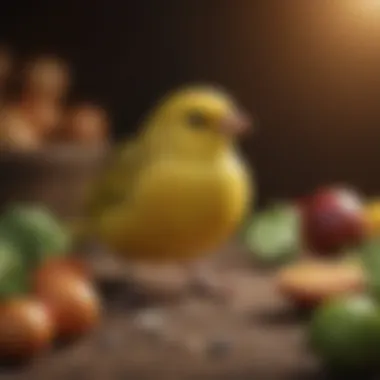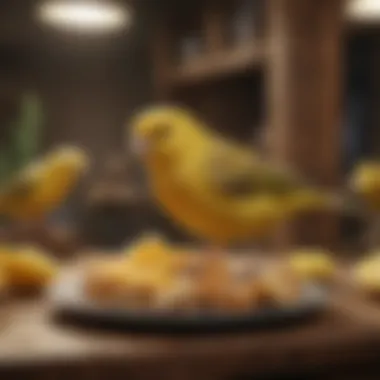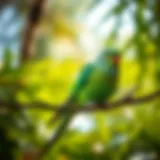Selecting the Best Canary Food for Optimal Health


Intro
Caring for a canary goes beyond providing a cage and some seed. These little avian companions require thoughtful attention and a deep understanding of their unique nutritional needs. When it comes to feeding a canary, the selection of food plays a significant role in their overall health and happiness. This guide aims to demystify the process of choosing the best food for your feathered friend.
Understanding what canaries eat is crucial for any bird owner. Just as humans benefit from a balanced diet, canaries thrive on a mix of nutrients that support their active lifestyle. This isn't just about filling a feeder; it involves a careful examination of what comprises a healthy diet, including seeds, fresh fruits, vegetables, and possibly pellets.
With that in mind, let’s break down some essential elements of avian care, beginning with the basics of their nutritional needs.
Understanding the Nutritional Needs of Canaries
Understanding what our feathered friends need nutritionally is more than just filling up a bowl with any old seed mix. Canaries, like any other pet, rely on a balanced diet to thrive. This section not only outlines the fundamental requirements but also highlights the consequences of neglecting their dietary needs. The health and vitality of these birds hinge on the right nutrition, which impacts their longevity and quality of life.
The importance of tailoring their diet involves recognizing specific elements—like their age, activity level, and even the time of year—which can greatly influence dietary requirements. Just as some of us prefer a hearty breakfast while others are fine with just coffee, canaries have their preferences, too.
The Role of Nutrition in Avian Health
Nutrition plays a critical role in avian health, acting as the very foundation for a canary's physiological functions. A balanced diet keeps their feathers glossy, ensures their song is sweet, and even supports their immune system. If a canary's diet lacks necessary nutrients, it can lead to a range of health issues that are, at times, irreversible.
"Good nutrition is the backbone of avian health. A well-fed canary is a happy canary."
A diverse diet not only covers their physical health but also influences behavioral traits. Birds that eat a balanced diet tend to be more active and engaging. On the flip side, improper nutrition can lead to lethargy and stress, hinting at the strong connection between what they eat and their overall disposition.
Essential Nutrients for Canaries
Let's break down the essentials that keep these cheerful creatures chirping away:
Proteins
Proteins are vital for growth, repair, and maintenance of body tissues. For canaries, protein helps in developing muscles and feathers. It's those proteins that ensure your canary can strut around proudly with vibrant plumage. Including high-quality sources of protein like hard-boiled eggs or soybean meal can work wonders. However, sourcing protein needs careful consideration; excessive intake can lead to obesity. Thus, balanced protein is pivotal.
Vitamins
Vitamins are as crucial for feathered friends as they are for humans. They support metabolism, enhance immune function, and bolster overall health. For instance, Vitamin A plays a role in maintaining healthy skin and feathers, while Vitamin D ensures calcium absorption, critical for strong bones. However, it's important to ensure you don't go overboard—too many vitamins can be as detrimental as too few, leading to toxicity.
Minerals
Minerals like calcium and phosphorus are indispensable for bodily functions. They not only contribute to bone health but are also essential for nervous system functionality. These elements can often be found in greens and some enriched seed formulations. Yet be cautious, as imbalances between minerals can lead to dire issues, such as metabolic bone disease.
Fats and Carbohydrates
While often overlooked, fats and carbohydrates provide the energy canaries need for their active lifestyles. Healthy fats are necessary, albeit in moderation, as they assist with feather health and hormone production. On the other hand, carbohydrates serve as an essential energy source, aiding in daily activities. However, watch for excessive sugary treats, which, while enticing, can lead to unhealthiness over time.
Choosing the right balance of these nutrients is vital to prevent deficiencies or toxicities. Each category has its place in the canary's diet and contributes uniquely to their overall well-being. In the end, a holistic approach to their nutrition results in a spirited, vibrant, and joyful canary.
Types of Canary Food Available
Understanding the varieties of food you can provide for your canary is really important for their overall health and happiness. The right type of food can significantly improve your feathered friend’s energy levels, plumage, and overall well-being. Many folks may think that any seed will do, but the truth is, selecting the right food is like hitting the nail on the head when caring for your pet bird. Let's break down different types of canary food and the benefits and considerations surrounding them.


Seed Mixes
Components of Seed Mixes
Seed mixes are the traditional go-to choice for many canary owners and for good reason. Often they consist of various seeds such as canary seeds, millet, and sunflower seeds—each contributing something unique. Sometimes, these mixes throw in dried flowers and herbs, which can boost nutrition and appeal. The great thing about seed mixes is their versatility; you can find different combinations to suit the whims of even the pickiest of eaters.
However, it’s crucial to pick high-quality seed mixes. If they’re filled with fillers and low-nutritional seeds, well, that ain’t gonna cut it. A seed mix should ideally have whole seeds without too much dust or broken pieces – because we all know birds love a good crunch.
Quality Assessment of Seed Mixes
When it comes to assessing the quality of seed mixes, you have to wear your detective hat. Look for mixes that clearly list their ingredients; transparency is key. A high-quality seed mix usually includes a variety of seeds along with a guaranteed analysis stating the nutrient content. What's unique here is you need to check for freshness. You wouldn't eat stale bread, right? The same goes for bird food. Freshness affects not just taste but also the nutritional punch these mixes deliver. A classic pitfall is to overlook the expiry dates or to purchase from places with vague labeling.
Pelleted Diets
Benefits of Pelleted Diets
Pelleted diets have gained traction among canary lovers, and it's not without reason. These diets are specially formulated to provide a balanced nutritional profile, making it easier to meet your canary’s needs. The beauty of pellets is they often contain essential nutrients your bird requires all in one go. Something folks appreciate is the reduced mess, as pellets don’t shell out waste like seeds do.
On the flip side, it’s vital to spot one potential downside: not every canary takes kindly to pellets. Some might initially turn up their beak at them. It may require some coaxing to make them dig into these dietary nuggets.
Comparative Analysis with Seed Mixes
Comparing pelleted diets to seed mixes reveals a clear divergence in approach. While seed mixes can be a bit of a free-for-all, pellets lay down the law with a set nutritional standard. For canaries that thrive on structure, pellets might just be the ticket. Yet, here’s a nugget of wisdom: while pellets provide balanced nutrition, they're often less engaging than a colorful seed mix.
So, you might find that mixing the two can lead to a winning formula. Incorporating both can diversify your canary's meals while keeping them excited about their food.
Fresh Fruits and Vegetables
Best Fruits for Canaries
Fruits can be a delightful addition to a canary’s diet! Fruits like apples, pears, and berries not only offer a taste sensation but also deliver valuable vitamins. These fresh treats can keep your canary vibrant and healthy, provided they are offered in moderation. Another great option is vitamin-rich oranges—canaries can take a peck at the juicy segments or the rind. Just steer clear of avocados; they’re toxic to birds.
Vegetables That Are Safe for Canaries
When it comes to veggies, think leafy greens! Kale, spinach, and carrots can really pack a nutritional punch. These greens offer not only essential vitamins but also fiber, which aids in digestion. On the downside, some canaries can be particular about trying new vegetables, but patience often pays off. Hence, when introducing new fruits or veggies, keep it easy and gradual.
Commercial Canaries Blends
Evaluating Product Labels
The world of commercial canary blends is vast, and navigating it can be a bit like wandering in a maze. Labels should tell you a lot—look for specific ingredients and the nutrients they offer. Ideally, an excellent canary blend should make it crystal clear what it's composed of, steering clear of vague terms. If a product claims to be “premium,” check the ingredient list.
One unique aspect of these blends is the inclusion of added minerals and vitamins that support health. Keep in mind that a balanced blend can come at a price. You often get what you pay for, so consider that when you're shopping around.
Ingredient Safety
Ingredient safety cannot be taken lightly. Some blends throw in questionable fillers that don’t do your canary any good. A helpful piece of advice is to stick with brands that are well-known and have a good reputation among seasoned bird owners. You can often find reviews or discussions in communities, like forums or Reddit, where pet bird owners share insights and experiences.
Challenges of Improper Nutrition


The road to a healthy canary is paved with the right nutrition. If you think about it, what goes into your canopy is just as vital as the air they breathe. Poor nutrition can lead to a bunch of issues that might not be immediately noticeable but can take a toll on your feathered friend over time. Addressing the challenges of improper nutrition not only ensures your canary's longevity but also enhances their quality of life. A well-fed canary is often a chirpy canary, and truth be told, you want your avian companion to be as lively as possible. Let's dive into the specifics of how poor nutrition affects these vibrant birds.
Common Disorders Related to Poor Diet
Canaries, like humans, don’t thrive on junk food. A diet lacking in essential nutrients can lead to various health disorders. Here are some common ailments to watch out for:
- Obesity: An overload of seeds without moderation can pack on the pounds. Obese canaries may become lethargic and face increased health risks.
- Feather Picking: Surprisingly, a poor diet can lead to stress and anxiety, which in turn may result in feather plucking. If your canary’s plumage looks a bit sparse, it might be time to reassess their meals.
- Respiratory Issues: Low-quality seeds can harbor mold or other harmful particles that can lead to various respiratory diseases. Keep an eye out for sneezing or lethargy.
- Digestive Problems: Constipation or other digestive troubles can arise when canaries don't get enough fiber or are fed the wrong type of food.
Being aware of these disorders can make all the difference in maintaining your canary’s health. You want a vibrant bird that sings beautifully and has a shiny coat, not one that looks a bit worse for wear.
Identifying Signs of Nutritional Deficiencies
Knowing what to look for is crucial when it comes to recognizing nutritional deficiencies in your canary. Here’s a quick checklist of signs to keep an eye on:
- Weight Changes: Noticeable weight loss or gain can indicate an dietary issue.
- Behavior Changes: Have they become distant or more aggressive? Behavioral shifts can correlate with nutritional imbalances.
- Poor Feather Condition: Dull feathers or excessive molting might indicate they aren’t getting the right vitamins.
- Lethargy: A canary that spends more time sitting rather than hopping about isn’t a happy camper.
Pinpointing these signs enables quick action. The sooner you realize something's off in your canary's diet, the better.
"An ounce of prevention is worth a pound of cure; this adage certainly rings true when talking about the nutrition of your feathered friends."
By keeping these factors in mind, you can ensure your canary receives the balanced diet they need to thrive. Acting on nutrition not only helps avoid potential problems but also enriches the bond you share with your bird in the long run. The importance of proper nutrition cannot be overstated—it lays the groundwork for a happy, healthy canary.
Factors Influencing Diet Choices
When selecting the right diet for your canary, various factors should be taken into consideration. The choices you make will resonate throughout your bird's health and quality of life. It’s not just about filling a bowl with seeds; it's about understanding how different elements can shape dietary needs. Awareness of these factors prepares you for a more tailored approach to nutrition, ultimately leading to a happier and healthier canary.
Age and Activity Level of Canaries
Age plays a significant role in determining the nutritional requirements of canaries. Young canaries need extra proteins for proper growth and development, while older canaries may require a diet that is easier to digest. A younger bird, much like a growing child, will thrive on enriched diets that promote vigorous energy levels and growth. Generally, a diet rich in high-quality seeds and soft foods is ideal for these feisty little things.
On the other hand, adult canaries, particularly those that are active, will benefit from a balanced mix that includes adequate carbohydrates and proteins to fuel their energetic lifestyles. Likewise, a sedentary canary may need a bit of moderation in their diet to avoid health complications such as obesity.
For example, if your canary spends more time singing and flitting around its cage, consider providing a mix that has a good amount of protein sources, like boiled eggs or specific types of seeds such as canary seed and millet. Each has its unique benefits.
"The key to a happy, singing canary lies in understanding its age and lifestyle."
Seasonal Dietary Changes
Canary diets shouldn’t remain stagnant throughout the year. Seasonal changes often mean a shift in the availability of fresh foods. In the spring and summer months, you may find that fresh fruits and vegetables are abundant and can offer a wonderful source of nutrition. For those months, introducing a variety of greens like spinach and kale, or fruits such as apples and berries can do wonders for your canary’s overall health.
Conversely, as the weather turns cooler, you may need to consider reducing the amount of water-rich foods to prevent chilling. Instead, providing more concentrated sources of nutrition becomes important. Think about incorporating grains and dried fruits. Just be cautious about monitoring their intake as these can be higher in sugars compared to fresh produce.
Being aware of these shifts allows you to adjust your canary's food actively, ensuring that they are nourished suited to conditions around them. It helps to have a sense of timing in what you offer, as it can contribute not just to their physical health but also influence their mood and behavior.
Both age and seasonal factors warrant attention when planning a canary’s menu. Balancing these considerations ensures that your feathered companion receives a diet that is not just nutritious but also aligned with its natural instincts and environment.
Feeding Practices for Optimal Health


Feeding practices play a crucial role in the overall health and well-being of canaries. Just like any pet, these delightful birds benefit from a careful approach to their diet. A well-thought-out feeding routine not only nurtures their bodies but also enriches their lives. Each canary has unique preferences and needs, which can shift over time due to age, activity, or seasonal changes. Adopting optimal feeding practices can help in maintaining a vibrant and healthy canary.
Establishing specific routines allows enough variety while preventing boredom from repetitive meals. Moreover, it helps in avoiding overfeeding or underfeeding, which can lead to complications. Hence, making informed decisions around feeding is essential for every canary owner.
Establishing a Feeding Schedule
A structured feeding schedule is akin to planting a seedling in well-tilled soil. It guides the bird into a rhythm, fostering consistent eating habits. Canaries thrive on routine; therefore, it's wise to feed them at the same time every day. Generally, offering fresh food in the morning can align well with their natural instincts, as birds tend to be more active at dawn.
Consider incorporating the following steps into your feeding schedule:
- Consistency: Stick to a daily timetable to develop a predictable routine for your canary.
- Monitor Activity: Observe your canary's eating habits, adjusting the schedule if necessary, to suit their energy levels.
- Healthy Variations: Introduce different foods throughout the week to keep it interesting and ensure a balance of nutrients.
Feeding canaries little and often helps in avoiding waste and maintaining freshness. If they leave food untouched, it may indicate it isn’t appealing. Ultimately, keeping to a schedule enhances their health and happiness.
Portion Control Techniques
Too much of anything can be detrimental, and canaries are no exception. Portion control techniques not only prevent obesity but also ensure nutritional needs are met without excess. It’s wise to gauge portions based on your canary's individual size and activity level. A small bird may need lesser quantities compared to a larger or more active one.
Here are some practical strategies:
- Measure Portions: Use a small scoop or teaspoon to determine accurate amounts, adjusting as needed based on your bird’s response.
- Fresh vs. Dry: While dry seeds can be stored longer, fresh fruits and vegetables shouldn’t exceed a few hours to maintain freshness and prevent spoilage.
- Daily Assessment: Check how much food is consumed daily. This gives you a better idea of whether to increase or decrease the portions.
In essence, mindful portion control leads to less waste and ensures your canary receives the right nutrition, yielding positive health outcomes.
Introducing New Foods
Adding variety to a canary's diet is essential to stimulating their palate and ensuring optimal nutrient intake. Introducing new foods is like opening windows to new experiences, fostering curiosity and better health. However, interesting enough, the process must be handled with care.
To introduce new foods, follow these steps:
- Gradual Introduction: Start with small quantities of the new food mixed with their familiar favorites. This can minimize resistance and help them adapt.
- Observe Reactions: Watch for reactions or preferences. Some canaries may immediately flock to new foods while others may take time to warm up.
- Variety Overload: Avoid offering too many new items at once, as it might overwhelm them.
Lastly, never forget to consult reliable resources on safe foods for canaries to prevent any unintended risks. Engaging in this delightful dance of introducing new flavors not only diversifies their meal but also enriches their lives.
Always remember, a happy canary has a well-rounded diet.
The End
In a world where pet ownership often comes with a myriad of responsibilities, understanding what goes into the diets of canaries is essential. The three main elements discussed—recapping the key points, and providing final recommendations for owners—serve not only as a summarization but also as a tool for insightful decision-making.
Feeding canaries the right diet directly ties into their overall health and happiness. From the seeds and pellets packed with the necessary nutrients to the fresh fruits and vegetables that add variety, each food option plays a significant role. Ignoring these needs can lead to serious health complications. Therefore, it's worth mentioning that a tailored nutritional plan can enhance their lives remarkably.
To truly appreciate the nuances of canary diets, one must consider their natural behaviors and dietary habits in the wild. Replicating this balance in captivity can help foster a sense of belonging and contentment. As we've explored throughout this guide, it's not merely about filling a bowl with food but constructing a well-rounded menu that respects their biological needs.
Recap of Key Points
- Nutritional Balance: Essential nutrients such as proteins, vitamins, and minerals must be prioritized. Without these, canaries may suffer from deficiencies that lead to various health issues.
- Types of Food: From seed mixes to fresh produce, understanding the options helps owners make informed decisions appropriate for their canaries.
- Feeding Practices: Establishing a consistent feeding schedule, practicing proper portion control, and slowly introducing new foods are all paramount in establishing a nourishing environment for canaries.
A well-fed canary is a happy canary, and happiness often translates to vibrancy in their singing and overall behavior.
Final Recommendations for Canary Owners
- Invest in Good Quality Food: The balance of nutrients in commercial blends can vary significantly, so always scrutinize labels. Brands like Kaytee and Zupreme are often recommended for their blends tailored for canary needs.
- Monitor Health Regularly: Pay attention to your birds. Subtle fluctuations in behavior or appearance might reveal underlying health issues linked to diet.
- Rotate Foods for Variety: Canaries benefit from a blend of different food types. Consider alternating fresh fruits and vegetables seasonally to enrich their diet.
In essence, selecting the best food for your canaries is an ongoing journey of discovery. It’s about making informed and thoughtful choices that consider all aspects of their well-being. By paying attention to their needs and adjusting habits accordingly, canary owners not only promote longevity but also enrich the pet-owner bond.















